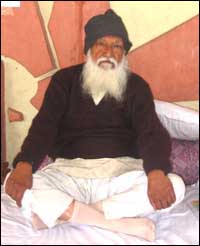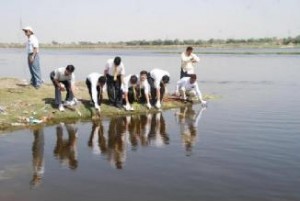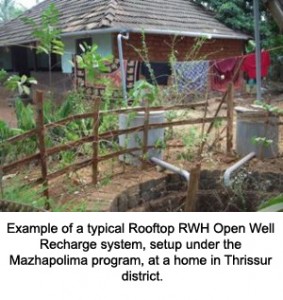/topics/public-infrastructure-and-services
Public Infrastructure and Services
Environment action plan for the city by Bangalore water supply and sewerage board
Posted on 11 May, 2009 12:38 PMThis presentation by the Bangalore Water Supply and Sewerage Board deals with the Environment Action Plan (Part – B) for Bangalore. The presentation begins with a description of the drainage pattern of the city and the major rivers in and around it. The objectives of the EAP are set out as –
- Stopping flow of raw sewage into storm water drains.
- Achieving zero discharge of raw sewage into drains.
- Conveying sewage to treatment plants and treating to meet standards.
- Improving environment.
- Improving socio-economic status.
Waternama - a collection of traditional practices of water conservation and harvesting in Karnataka
Posted on 08 May, 2009 05:16 PMWaternama is a collection of traditional practices for water conservation and management in Karnataka. The book is produced by Communication for Development and Learning and edited by Sandhya Iyengar.
View/download the full book (29.2 MB)
WASMO wins United Nations Public Service Award 2009!
Posted on 08 May, 2009 12:56 AMForwarded to the Portal by: Madhavi Purohit, WASMO
Image and Content Courtesy: WASMO, UNPAN 
 Water and Sanitation Management Organisation (WASMO), Gujarat wins the United Nations Public Service Award. Water and Sanitation Management Organization (WASMO) of Government of Gujarat has been declared winner for 'United Nations Public Service Award - 2009' under the category of "Fostering participation in policy-making decisions through innovative mechanisms"for "Institutionalization of Community Managed Drinking Water Supply Programme and User Level Water Quality". This award will be received at a ceremony to be held on 23rd and 24th June 2009 at United Nations Head Quarters in New York. It is an internationally acclaimed Award being conferred by the United Nations, Division for Public Economic and Public Administration, New York, for recognizing the significant contribution made by the organization to improve the public administration. The UNPSA Programme recognises institutional efforts to design, provide and expend services to citizens in a cost effective manner while promoting people's participation in the design of services and the definition of their needs for poverty alleviation and as a step forward to achieving the Millennium Development Goals.
Water and Sanitation Management Organisation (WASMO), Gujarat wins the United Nations Public Service Award. Water and Sanitation Management Organization (WASMO) of Government of Gujarat has been declared winner for 'United Nations Public Service Award - 2009' under the category of "Fostering participation in policy-making decisions through innovative mechanisms"for "Institutionalization of Community Managed Drinking Water Supply Programme and User Level Water Quality". This award will be received at a ceremony to be held on 23rd and 24th June 2009 at United Nations Head Quarters in New York. It is an internationally acclaimed Award being conferred by the United Nations, Division for Public Economic and Public Administration, New York, for recognizing the significant contribution made by the organization to improve the public administration. The UNPSA Programme recognises institutional efforts to design, provide and expend services to citizens in a cost effective manner while promoting people's participation in the design of services and the definition of their needs for poverty alleviation and as a step forward to achieving the Millennium Development Goals.
Young professionals initiative by Indicorps
Posted on 23 Apr, 2009 12:40 PM Indicorps invites young Indian professionals interested in committing their time and skills to India to apply for its new sabbatical program: The Young Professionals Initiative (YPI). YPI is a pilot program designed to encourage young working professionals to contribute their skills and knowledge to the land of their heritage in a meaningful way. The core fellowship program aims to inspire a new generation of global Indian leaders through structured grassroot public service opportunities. Indicorps projects embody a firm and demonstrated commitment to promoting peace, inclusiveness, secularism, and the empowerment of Indians.
Indicorps invites young Indian professionals interested in committing their time and skills to India to apply for its new sabbatical program: The Young Professionals Initiative (YPI). YPI is a pilot program designed to encourage young working professionals to contribute their skills and knowledge to the land of their heritage in a meaningful way. The core fellowship program aims to inspire a new generation of global Indian leaders through structured grassroot public service opportunities. Indicorps projects embody a firm and demonstrated commitment to promoting peace, inclusiveness, secularism, and the empowerment of Indians.
The Sambalpur declaration on Odisha rivers : Let the river flow
Posted on 23 Apr, 2009 12:04 PMWater Initiatives Orissa(WIO) and the Indian River Network (IRN) organsied the Odisha River Conference during 18 - 20 April 2009 at Sambalpur, Odisha. Attended by about 75 participants which included activists, environmentalists, journalists, academicians, researchers and civil society representatives from across the country, the Conference has just concluded with a "Sambalpur Declaration" that calls for saving the rivers from the current fate of high rate of degradation and giving communities their traditional rights over the rivers, among other strong resolutions.
Agra: Yamuna river trash cleanup 2009
Posted on 23 Apr, 2009 11:45 AMAhead of the Lok Sabha polls, hundreds of students of several schools along with senior citizens cleaned up Poiya Ghat Sunday morning, picking up rags and used polythene bags, to focus attention on river pollution which candidates of various political parties have chosen to ignore.
Brij Khandelwal, programme convener of the Yamuna Foundation and Rivers of the World Foundation, said apart from students involved in the My Clean Agra initiative, a large number of other voluntary groups and organisations were involved in Sunday's programme which specifically targeted the politicians for failing to clean up the cities and the rivers of India.
"No political party has bothered to say a word about how they would save a dying river and rejuvenate it or restore its original glory," said Subhash Jha and Haridutt Sharma of the Yamuna Foundation for Blue Water.
"Mazhapolima"? : Participatory well recharge programme in Thrissur district, Kerala, part 2
Posted on 13 Apr, 2009 03:35 PMThe Mazhapolima program is quite unique; it aims to (eventually) recharge about 4.5 lakh dug wells in the district, and do this through community awareness and action. It's driven by the District Collector, Mr. Kurian Baby, who strongly advocates sustainable, local development & innovation.
A Gram Panchayat (GP) in Kerala is fairly large, and has a population of approximately 20000 people, as compared to about 10000 in Karnataka, and about 700 in Uttar Pradesh. GP's have ward divisions, about 20 of them per GP. Each GP has a staff of at least 6-8 people. The GP that we visited - Adat, had about 12 employees , 4 lower division clerks, 3 upper division clerks, 1 Joint Secretary, 1 Secretary, 2 peons and 1 sweeper. Except for the peons and the sweeper, the employees are all usually SSLC-pass, but here in Adat they were mostly graduates. For salaries alone, the GP spends about Rs 1.5 lakhs per month. Adat GP executed 124 projects last year. The GP's annual budget was Rs 1.40 crores, not including NREGA funds. Out of this, Rs 40 lakhs was raised by the GP through property taxes etc. Most other parts of the country, GP budgets are only about 5 to 10 lakhs. The Adat GP office was a large 2 storeyed building. Mr Vijayan, the Joint Secretary proudly showed us their awards, which filled up an entire wall.
Protesting broken promises: Dr. G.D. Agrawal resumes fast-unto-death
Posted on 20 Jan, 2009 12:19 PM
Images of a dying river, handwritten Press releases & more: Images of a Struggle on Flickr Charging the Government of India with not keeping its solemn commitment to keep the River Bhagirathi alive in its pristine stretch from Gangotri to Uttarkashi, Dr. G.D. Agrawal has resumed his fast-unto-death from Makar Sankranti Day, Wednesday, Jan 14, 2009.
You may recall that Prof. G. D Agrawal, former Professor & Dean of Students at IIT-Kanpur, the first Member-Secretary of India's Central PollutionControl Board and one of India's foremost environmental scientists went on a fast from June 13, 2008 to seek uninterrupted flow of River Bhagirathi (Ganga) in its natural form between Gangotri and Uttarkashi. His demand was very limited & specific, i.e., that the River Ganga be allowed to flow in its natural form in this 125 km stretch from its origin. This is the only stretch left now where the Ganga can still be seen in its pristine form. Dr. Agrawal requested the Govt. of India & the State Govt. of Uttarakhand to stop construction of Hydro Electric Projects (HEPs) in this stretch so that river flow was not diverted through tunnels that would destroy its ecology and its unique self-purifying properties. (diagrams are provided in the attached press release). Indians across the world got sensitized and lent their support to Prof Agrawal. Many wrote or met the PM of India and the CM of Uttarakhand and requested them to protect the Holy Ganga , whom Pandit Jawaharlal Nehru described as India's civilizational identity.
Book Shelf : Special discount offer: Between the Devil & Deep Water : by Dr Mishra
Posted on 08 Nov, 2008 09:58 AM The Kosi floods in Bihar stunned the world this year. But the real tragedy is that the disaster had been predicted. It was simply waiting to happen. The Kosi embankments were completed in 1963 with a designed life span of 35 years.
The Kosi floods in Bihar stunned the world this year. But the real tragedy is that the disaster had been predicted. It was simply waiting to happen. The Kosi embankments were completed in 1963 with a designed life span of 35 years.
Sri. Dinesh Kumar Mishra on the flooding of Kosi basin,2008
Posted on 03 Sep, 2008 07:06 PMDr. Jagannath Mishra, former Chief Minister of Bihar, has given a pathetic description of floods in Bihar. He said that "Nobody from the government has gone to Saharsa so far. If the people in Saharsa are surviving, they must be saying that we are engulfed in water since ten days and nobody is there to think about us. This is quite worrisome. I will suggest that we must try to look after those surviving there. We must try to save them, whether by boats or a helicopter.. The flood in Saharsa is not a flood, this is unprecedented¦.we cannot call it a flood, it is a deluge." But wait, he is not talking about the recent floods (2008) in Bihar. He was making a speech in the Bihar Vidhan Sabha on the 13th September 1984 about a similar incident that took place on the 5th September 1984 near Navhatta in Saharsa district of north Bihar when the Kosi had breached its embankment at 75th kilometer south of the much talked about Bhimnagar Barrage and come out of the jacket just as it happened at Kusaha this year. Obviously, the powers that be refuse to take any lessons from the past mistakes and their executive wing, the Water Resources Department, is immune to any criticism and learning. The 1984 incident had uprooted nearly half a million people from their homes and hearths and engulfed 96 villages spread over 7 blocks of Saharsa and Supaul districts then. They could return to their homes only after the Holi festival in March 1985.







